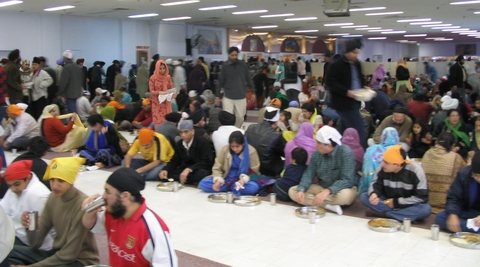BELIEFS
Guru Nanak’s concept of God is that of a Benevolent and Gracious Being whose primal covenant with humankind is to provide them with a refuge of his abiding love. God in His essence is nothing but pure and good. God is all love. Guru Granth Sahib abounds in positive, moral and ethical attributes of God. God has been extolled as father (pita), Mother (mata), brother (bhrata), friend (mittar), protector and helper (rakhanhar), shelter of the poor (greebniwaj), helper to the helpless (nidharian didhir), as remover of pain and suffering (dukh bhanjan) as generous and forgiving (daata, danee, dyal, bakshind), merciful (raheem), etc. This aspect of God is significant because it assures humankind Divine support and direction. God saves the saints, protects the righteous and redeems the repentant sinners.
PURPOSE OF LIFE
EQUALITY IN BROTHERHOOD
Guru Gobind Singh said: ‘recognize all belonging to the one race of humanity’.
The Sikh Gurus were particularly concerned with gender equality. Women were discriminated against. They were considered inferior. Guru Nanak strongly disapproved of this thought. He encouraged them to take an active role in every sphere of life. He said:
JUSTICE AND HUMAN RIGHTS
PRACTICES
Naam Japna: Meditate on Naam. Naam is the essence of God. Naam is the total expression of all that is God. Naam sustains everything. Gurbani (Divine Word) itself is Naam ( SGGS p.1239). Naam is supreme. Salvation cannot be attained without Naam. Everything that is visible is ultimately destroyed except Naam. Naam Japna means remembering God to invoke His presence in one’s consciousness. Doing daily prayers, any form of recitation of Gurbani (Guru’s Word), simple reading with attention and direction, meditation on any hymn or kirtan (singing) of Gurbani is fully deemed as Naam Japna. A Sikh concentrates on God to reflect on God’s virtues. This is to inculcate such virtues into his/ her character and to observe the presence of God in every human being.
Kirt Kamaayee: A person is to earn his/her livelihood by honest means. Those who earn their livelihood with honest labour, even though poor, are better than those who accumulate wealth by exploiting others. Dishonest earnings are declared by the Guru as the ‘blood of the poor’. Guru Nanak said, ‘Taking what is due to others is as sinful as pork is to a Muslim and beef to a Hindu’. ( SGGS p. 141).
Vand Chhakna: Share your earnings. It is a social responsibility to share one’s earnings with the needy. Sharing must not be done with pride. Guru Nanak says: ‘He knows the way, who earns his living and shares his earnings with others’ ( SGGS , p.1245).
Family: The cardinal principles can best bepractised while living truthfully as a householder. The Sikh Gurus believed that asceticism and renunciation of the world is unnecessary. The Sikh Gurus themselves were married and lived as householders. The life of a devout householder is favoured.
Sangat and Pangat: In order to give concrete expression to his ideas of unity, equality and fraternity, Guru Nanak started the twin institutions of sangat and pangat According to these principles the high and low, rich and poor, men and women could sit together, pray together and eat together. Remembrance of God’s name is to be practised not only in the solitude of one’s home but also in sangat.Sangat is the holy congregation. It is aimed at improving the spiritual perception, ethical discipline and social harmony of the congregation. It had the distinctive practical purpose of carrying the society forward towards collective enlightenment. It enables people to imbibe the spirit of universal love, peace, tolerance and brotherhood. In Sri Guru Granth Sahib the creative role of sangat is repeatedly emphasised.
Sangat in the Gurduara

Pangat in the Gurduara (Photo by Philip Hughes)
Sewa and Simran: (Service and meditation) The Sikh Gurus undertook preaching tours and established Gurduaras(places of worship - house of the Guru). They also established new townships. The devotees visited them in large numbers and met there every day and formed into large sangats. Some stayed for long periods of time. They were offered free food and accommodation. The Gurus prompted the Sikhs to promote the welfare of their fellow beings. So they participated in community projects and the preparation and serving of langgar. All this is referred to as sewa. Sewa is simply the performing of service to the community out of love and devotion without the expectation of any reward. They also participated in daily religious services referred to as simran. Simran is the continuous remembrance of God’s Name. Sikhs today follow these principles wherever they are. Simran and service go hand in hand. Physically the person does the service while the mind is in tune with God.
